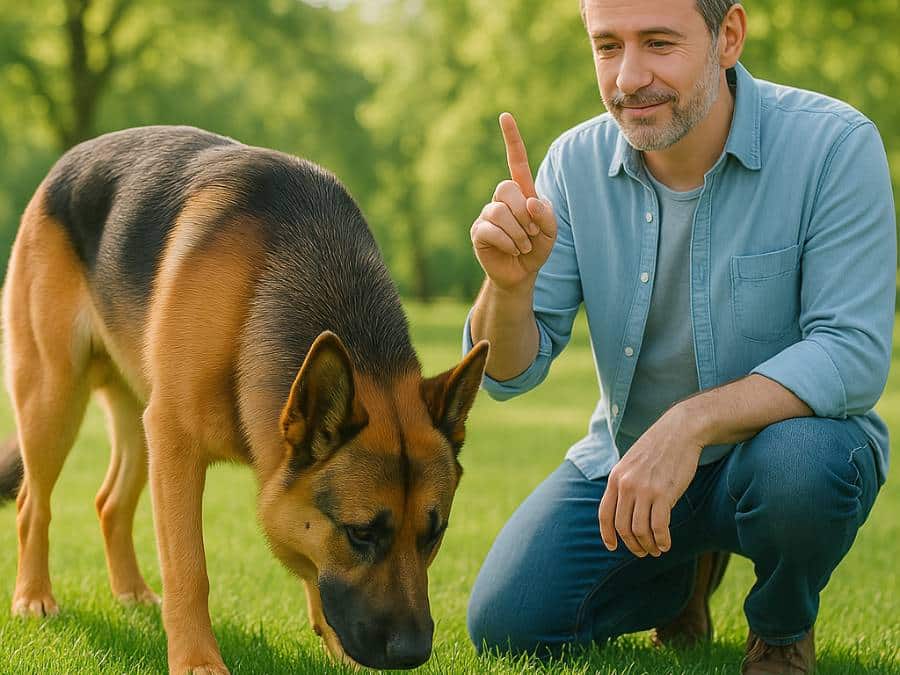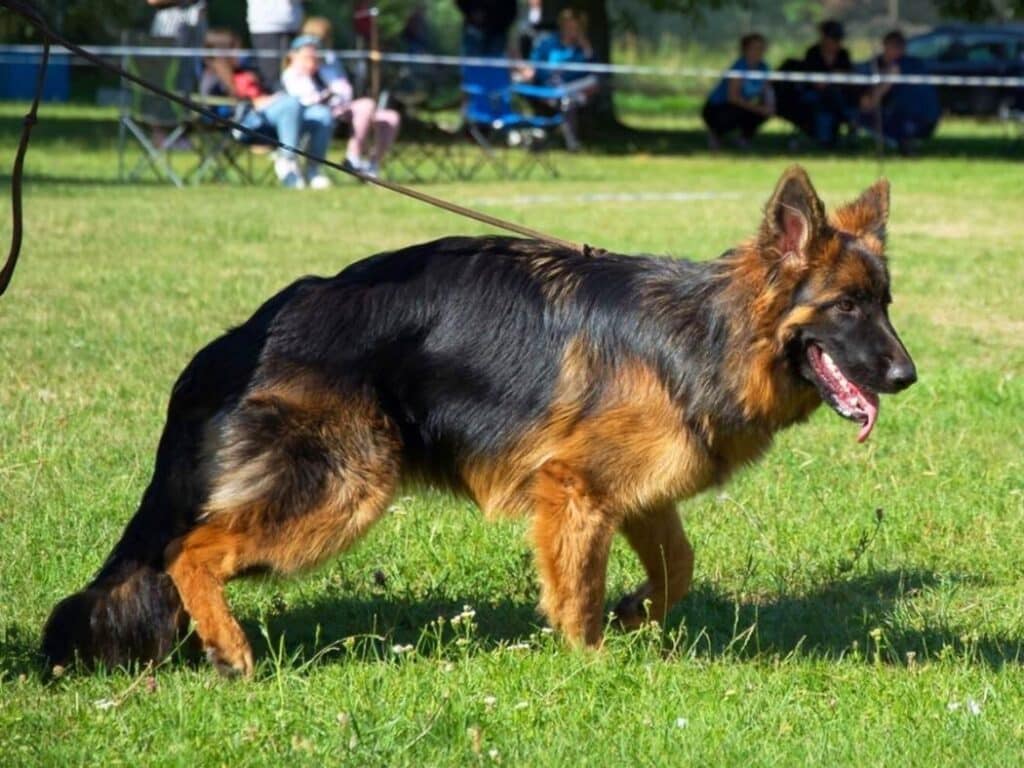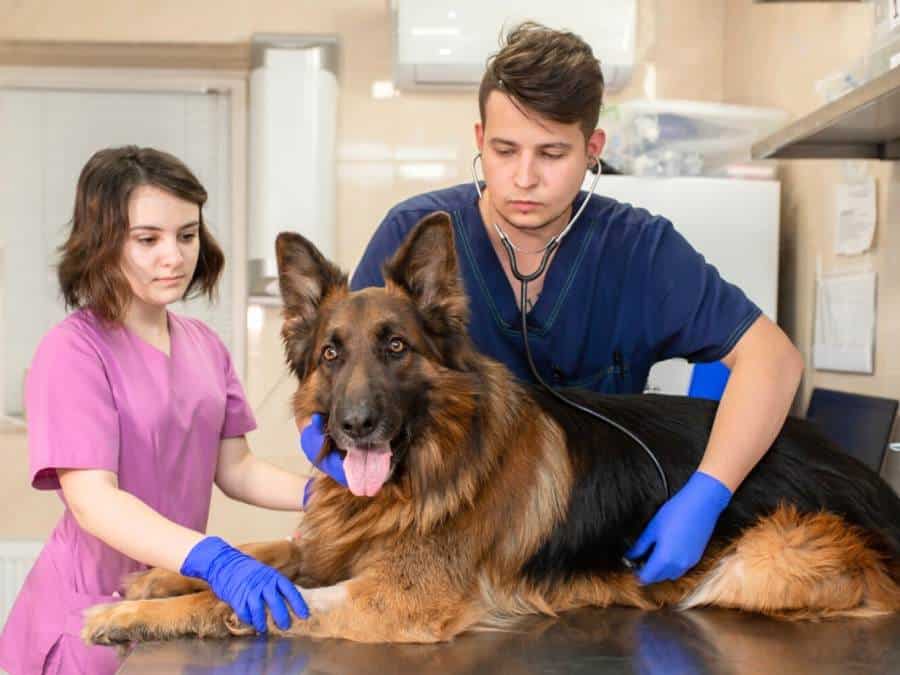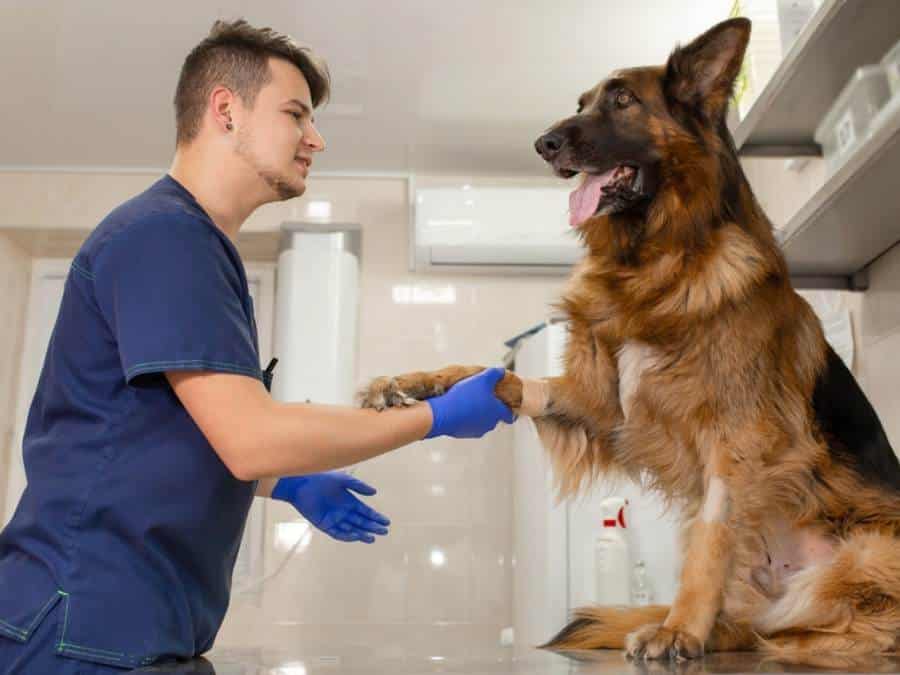Have you ever turned around and caught your German Shepherd doing something downright disgusting — like eating poop? If yes, you’re not alone.
As unsettling as it may seem, poop-eating (a behavior called coprophagia) is surprisingly common among dogs — and yes, even smart, well-trained German Shepherds can do it.
In this post, I’ll walk you through the real reasons why your German Shepherd might be eating poop, what you should rule out medically, and step-by-step ways to stop this behavior — without shaming or scolding your dog.
Let’s get into it.
Why Do German Shepherds Eat Poop?
As strange (and stomach-turning) as it sounds, there are a few surprisingly common reasons behind this behavior. Understanding the why is the first step to solving the problem.
1. It’s Instinctual (Especially in Puppies)
In the wild, mother dogs clean up after their puppies to keep the den area clean and scent-free.
Puppies may also mimic this behavior — especially if they’re in the habit of exploring the world with their mouths. For many GSDs, it starts young and simply becomes a habit.
2. They’re Bored or Understimulated
German Shepherds are incredibly smart and high-energy. If they’re not mentally stimulated or physically tired, they may turn to odd behaviors just to entertain themselves — and unfortunately, poop might be part of that “fun.”
3. Nutritional Deficiencies or Poor Diet
Sometimes, your dog might be trying to “fix” something missing in their diet. If they’re not digesting their food properly or aren’t getting enough nutrients, they might try to re-digest waste. A low-quality diet or lack of digestive enzymes can be a trigger.
4. Stress, Anxiety, or Past Trauma
Dogs under stress — especially rescued or kenneled dogs — may eat poop as a coping mechanism.
It can also be a leftover behavior from a stressful environment or poor potty training history where they were punished for pooping.
If your GSD is still being potty trained, it’s important to rule out any confusion between where they should eliminate and what’s considered off-limits.
Read my full guide on how to potty train your German Shepherd
5. Medical Issues
In some cases, poop-eating can be linked to underlying health problems like:
- Intestinal parasites
- Diabetes
- Exocrine Pancreatic Insufficiency (EPI)
- Malabsorption disorders
(We’ll cover this more in the next section.)
6. Seeking Attention
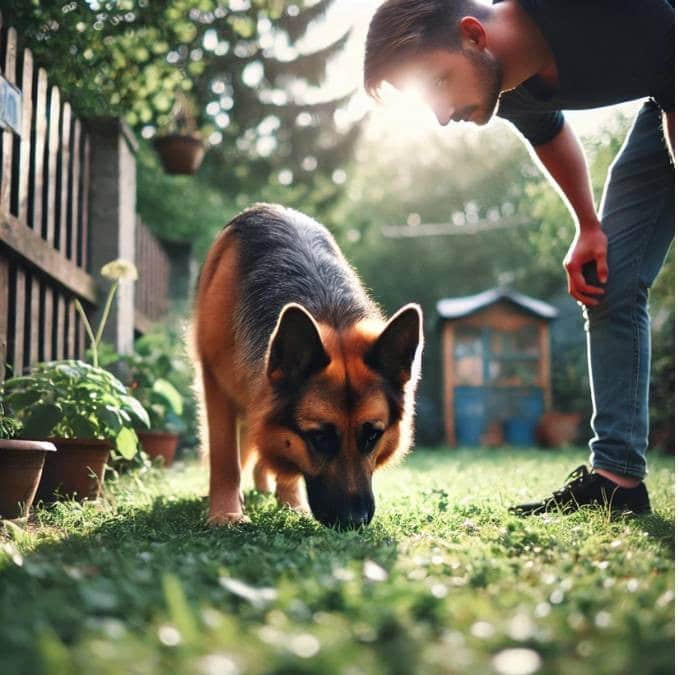
If your dog learns that eating poop gets a big reaction from you — even a negative one — they might repeat it just to get your attention.
Rule Out Medical Causes First
Before jumping into training or deterrents, it’s important to make sure your German Shepherd’s poop-eating habit isn’t rooted in a medical issue. Sometimes, what looks like a behavioral quirk is actually your dog’s way of signaling something’s off inside their body.
Schedule a Vet Visit
If your GSD has suddenly started eating poop — or if they’ve been doing it consistently despite good training and diet — your first step should be a thorough checkup with your veterinarian.
Ask your vet to check for:
- Intestinal parasites (like worms)
- Exocrine Pancreatic Insufficiency (EPI) — common in GSDs and can lead to poor digestion
- Nutrient absorption issues
- Diabetes or thyroid problems
These conditions can cause your dog to feel hungrier than usual or crave odd things due to nutritional imbalances.
Diagnostic Tests May Include:
- Fecal test for parasites
- Blood work
- Enzyme tests for pancreatic function
If any health issue is diagnosed, your vet will guide you with the appropriate treatment — and once the root cause is addressed, the poop-eating habit often disappears on its own.
Explore more common German Shepherd health problems and learn how to deal with them.
Nutrition Matters
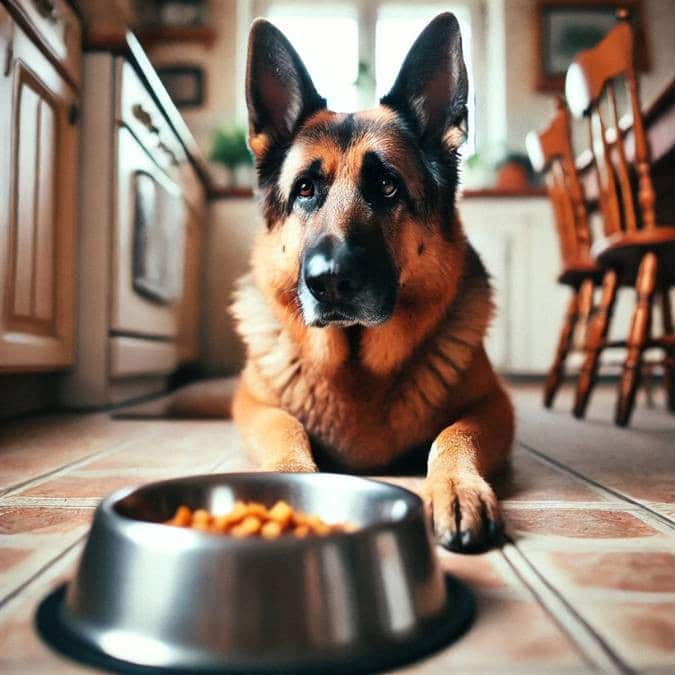
Once medical causes are ruled out, the next area to explore is your German Shepherd’s diet. What your dog eats — and more importantly, what they absorb — can play a big role in poop-eating behavior.
Is Your Dog Getting the Right Nutrients?
Sometimes, dogs eat poop because their body is craving something it’s not getting from food — like certain vitamins, minerals, or enzymes. In some cases, it’s not that the diet is bad, but that your dog isn’t fully absorbing the nutrients due to digestive inefficiencies.
Signs your dog’s diet might be lacking:
- Frequent soft stools or diarrhea
- Excessive hunger
- Dull coat or skin issues
- Low energy levels
Improve Digestibility
Switching to a high-quality, easily digestible diet can make a big difference. Look for food with:
- Real meat as the first ingredient
- No fillers or artificial preservatives
- Balanced omega-3 and omega-6 fatty acids
Some German Shepherds thrive on limited-ingredient or grain-free diets, especially if they have sensitive stomachs.
Consider Supplements
If your vet suspects a digestive issue or you simply want to give your GSD extra support, these supplements may help:
- Digestive enzymes – help break down food and improve nutrient absorption
- Probiotics – support gut health and immune function
- Multivitamins – fill in any nutritional gaps
Recommended: I’ve created a curated list of Poop-Eating Solutions on Amazon that includes trusted enzymes, probiotics, and other useful tools — all selected to stop your GSD from eating poop..
Environmental Management
While working on training and nutrition, it’s just as important to manage your GSD’s environment to reduce temptation. Prevention is often the fastest way to break the poop-eating habit — especially in the early stages.
1. Clean Up Immediately
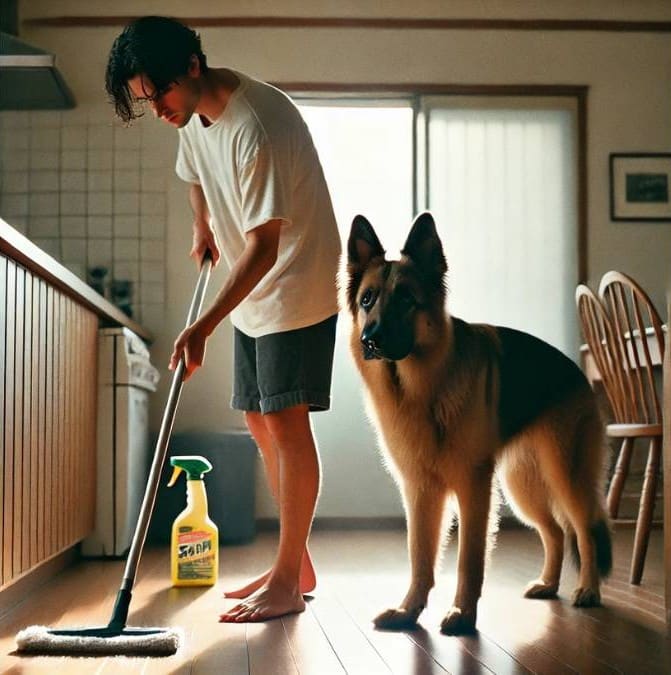
The more opportunities your dog has to access poop, the more the behavior gets reinforced. Whether it’s their own poop, another dog’s, or even a cat’s — the key is to remove it as soon as possible.
- Pick up poop right after your dog eliminates (yes, even in your own backyard).
- If you have more than one dog, supervise them to prevent one from snacking on the other’s waste.
2. Leash Walks for Better Control
If your German Shepherd eats poop during walks or at the park, keeping them on a short leash gives you more control. Use commands like “leave it” or “heel” when they show interest in droppings.
3. Block Access to Cat Litter
Cat poop is especially tempting to dogs (I know—ew). If you have a cat at home:
- Use a covered litter box
- Place the litter box in a gated or elevated area only the cat can access
4. Clean Indoors Too
If your GSD has accidents indoors, clean them thoroughly using enzymatic cleaners. Lingering smells can encourage poop-eating behavior, especially in puppies.
Training Techniques to Stop Poop Eating
Once you’ve handled medical and environmental factors, it’s time to focus on training — the key to long-term success. German Shepherds are highly intelligent and eager to learn, which means consistent, reward-based training can make a huge difference.
1. Teach the “Leave It” Command
This is a lifesaver, not just for poop but for anything you don’t want your dog eating.
- Start by practicing with non-poop distractions (like treats or toys).
- Gradually work your way up to using it during potty breaks when they try to sniff or approach poop.
- Reward generously when your dog listens.
Tip: Say “leave it,” and the moment your GSD looks away, offer a tasty treat and praise.
You can check out my full guide on GSD training commands here.
2. Redirect with Reward-Based Training
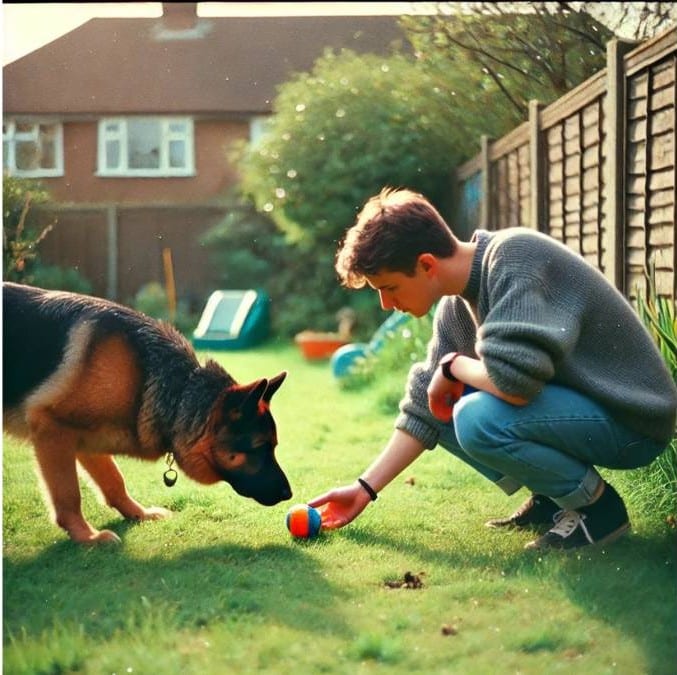
Immediately after your dog poops, call them to you in a happy tone and reward them with treats or play. This helps them associate pooping with coming to you — not turning around and eating it.
3. Work on Impulse Control
Poop eating is often an impulse behavior. By strengthening your dog’s self-control through training games and structured routines, you reduce the urge to act on impulse.
Brain Training for Dogs
If your German Shepherd is smart (which they are), then you’ve probably noticed something:
They don’t just need training — they need mental stimulation to feel truly fulfilled.
That’s why I highly recommend the Brain Training for Dogs course. It’s full of fun, science-backed games that build focus, impulse control, and obedience — perfect for breaking unwanted habits like poop eating.
4. Use a Basket Muzzle (if needed)
If your dog is obsessed with eating poop and nothing else is working, a basket muzzle can be a temporary management tool during walks. It doesn’t hurt the dog and still allows panting, drinking, and treat-taking — but blocks access to poop.
Important: A muzzle is not a punishment — it’s a tool to give you time to work on training without constant setbacks.
5. Never Punish
Scolding your dog for eating poop can backfire. It may cause stress or even make them eat it faster to “hide the evidence.” Always focus on redirection and positive reinforcement instead.
Try Taste Deterrents (If Needed)
If your German Shepherd keeps sneaking a bite despite training and supervision, you can try taste deterrents as a backup strategy. These are supplements or additives that make poop taste unappealing to dogs — even more than it already should!
How They Work
You add a deterrent supplement to your dog’s food, and it changes the taste of their stool to something bitter or unpleasant (for them — you won’t notice a thing). Some work by altering smell or texture; others include digestive enzymes or herbs to reduce the appeal.
Common ingredients include:
- Yucca extract
- Parsley
- MSG alternatives (to make stool taste “bad”)
These won’t work overnight and they don’t work for every dog — but they can be a useful part of your toolkit, especially when paired with training and proper cleanup.
Recommended Products
I’ve put together a handpicked list of poop-eating deterrents, digestive aids, and training tools that can really help.
Browse My Poop-Eating Solutions List on Amazon
You’ll find gentle deterrents, enzyme supplements, and other helpful tools that have worked for many GSD parents (and their pups!).
Conclusion
Watching your German Shepherd eat poop can be frustrating, embarrassing, and downright confusing — but remember this: you’re not alone, and this behavior is fixable.
Whether it’s rooted in instinct, boredom, diet, or something medical, the key is to stay patient and take a step-by-step approach.
Most importantly, don’t punish your dog — guide them. With time, consistency, and a little detective work, your GSD will grow out of this habit.
Frequently Asked Questions
1. Is it normal for German Shepherds to eat poop?
Yes, it’s surprisingly common — especially in puppies. The behavior is known as coprophagia and can be triggered by boredom, instinct, stress, nutritional deficiencies, or even health issues. While it’s not ideal, it’s usually fixable with the right approach.
2. Can poop-eating make my German Shepherd sick?
Yes, eating poop (especially from other animals) can expose your dog to parasites, bacteria, or viruses. It’s important to break the habit to protect your dog’s health — and always schedule a vet checkup if the behavior is new or persistent.
3. Will adding pineapple to my dog’s food stop poop eating?
Some dog owners have found mild success adding pineapple or pumpkin to meals, as they can change the taste of the stool. However, results are mixed. A more reliable solution is using specially formulated poop-eating deterrents — check out my Poop-Eating Solutions List for safe, effective options.
4. How long does it take to stop this behavior?
It depends on the cause and how consistent you are. Some dogs improve within a few weeks, while others take a few months — especially if it’s a long-standing habit. Stay patient, follow a structured plan, and celebrate small wins along the way.
5. Should I punish my dog for eating poop?
No. Punishment can increase anxiety and may even make the behavior worse. Instead, focus on positive reinforcement, clear training commands like “leave it,” and removing opportunities for your dog to engage in the behavior.

